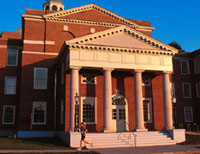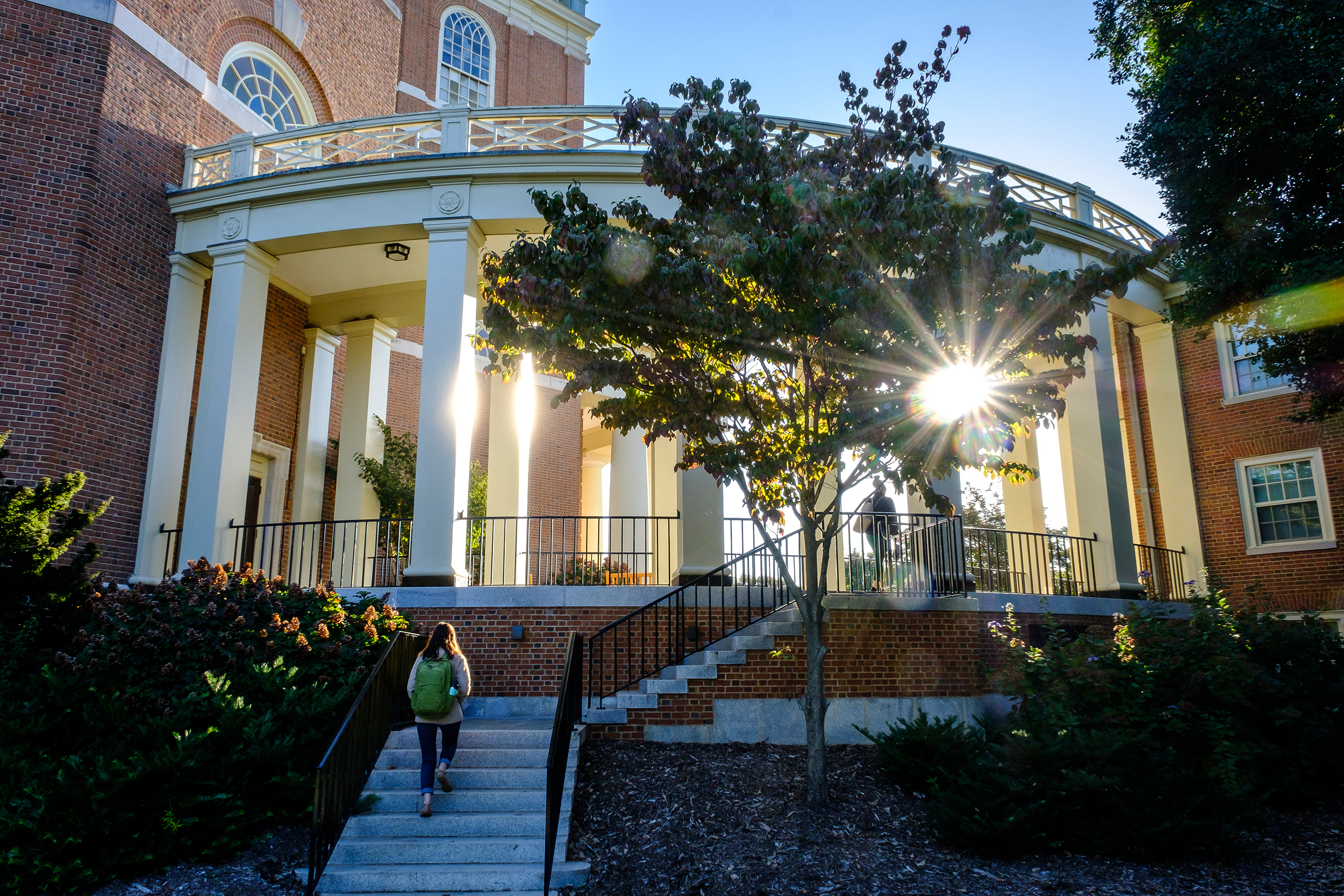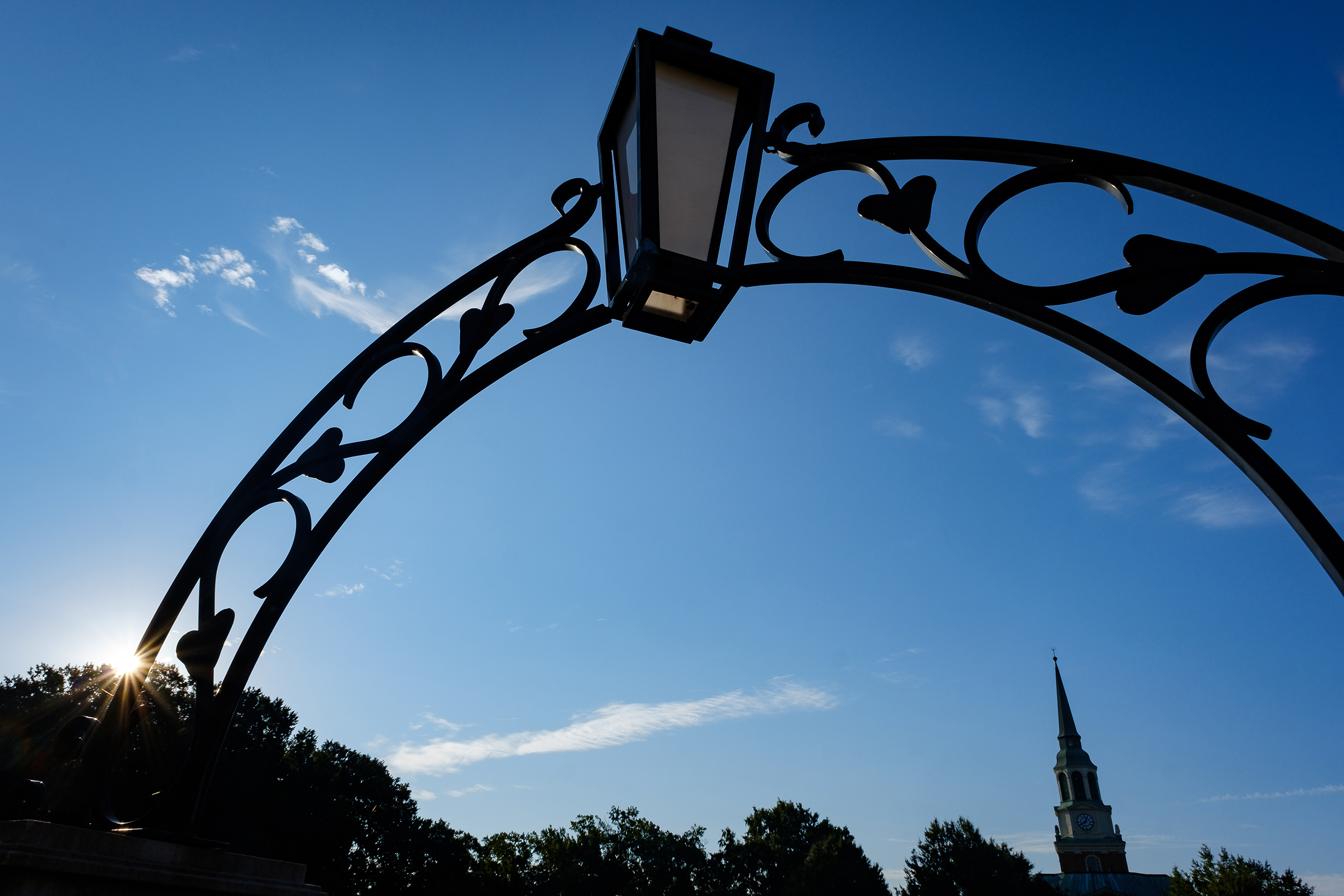WFU Divinity School prepares to make history with first graduating class
 Twenty students will make history May 20 when they become the first class to graduate from the Wake Forest University Divinity School. Like many theological school graduates, most of the students will seek ordination, and several hope to become congregational ministers. But the class is extraordinary because its members represent seven different denominations.
Twenty students will make history May 20 when they become the first class to graduate from the Wake Forest University Divinity School. Like many theological school graduates, most of the students will seek ordination, and several hope to become congregational ministers. But the class is extraordinary because its members represent seven different denominations.
“Christian by tradition, ecumenical in outlook, and Baptist in heritage” is the Divinity School’s motto. When the school opened in 1999, it was the first university-related divinity school to open without an official denominational tie.
The Divinity School’s ecumenical approach and intensive vocational development program are designed to prepare students for the ministry and related careers, said Bill J. Leonard, dean of the Divinity School.
“Our first students have invested themselves extensively in shaping the school,” Leonard said. “They have been partners with us in affirming and assessing who we are and where we want to be.”
The Divinity School has 70 students from 11 different denominations studying full-time to earn the master of divinity degree. The program lasts three years and includes summer study. This spring’s graduates entered the school in the fall of 1999.
Kristin Gerner, a third-year student from Salisbury, N.C., says being part of the first class was exciting and frightening. She is a member of the United Church of Christ.
“People sometimes forget that we’re like any other professional students – law students, medical students – except that our education is in who you want to be as much as what you want to be,” Gerner says. “So you take an even greater risk at a new school, especially one that is ecumenical.”
Leonard says the Divinity School’s ecumenical approach equips students with the ability to function in a world where old denominational systems are changing. Now that several Protestant denominations officially recognize each other’s ordinations, theological graduates have even more flexibility when looking for jobs, he said, but that comes with the added responsibility of knowing about different faith traditions.
David Brown, a Baptist third-year student from Marietta, S.C., agrees.
“As denominational walls are falling in America, there is no better place to prepare for the ministry than in a school that is a microcosm of that world,” said Brown.
The Divinity School’s ecumenical approach also allows students to explore their religious identity, Leonard said.
“In order to claim myself as a Baptist, I had to examine that tradition by holding it up to other traditions,” says Elizabeth Parker, a third-year student from Winston-Salem, N.C. “Now I can truly, fully claim myself as a Baptist, and I could not do that before.”
The Divinity School curriculum includes instruction in traditional seminary subjects like biblical studies, church history, theology, homiletics (the art of preaching), spirituality and pastoral care taught by full-time Divinity School faculty. Because the school is set within the larger context of the university, students are also able to study under other Wake Forest faculty. Divinity students have taken courses in the religion and classics departments, at the School of Law and in Wake Forest Baptist Medical Center’s Clinical Pastoral Education program.
To complement the traditional curriculum, the Divinity School also offers a unique vocational development component that requires intensive participation through all three years of study, Leonard said. The program provides a series of professional development activities and opportunities for reflection on the ministry. Through this component, students work in a church or other ministry setting and are paired with mentors in the community.
The school also offers on-site courses and multicultural ministry seminars in Cuba, New York City and rural Appalachia. Another unique component is the first-year colloquium that covers emerging issues in theology and ministry.
Most of the third-year students have begun the ordination process. Some will be ordained through their denomination while others will be ordained by their “home” church, depending on guidelines set by their faith tradition. Many hope to become congregational ministers. Others will continue their education in doctoral programs, and a few hope to work for nonprofit groups doing social ministry.
Some third-year students will use their master of divinity degree to continue work they began before coming to the Divinity School.
Jennie Hemrick, a member of the Presbyterian Church USA who is from Danbury, N.C., spent 18 years working as a victims’ advocate in the court system before she enrolled in the school in 1999. For her senior project, she is working with the Center for the Prevention of Violence Against Women in Seattle to create training materials to help clergy respond to women and families who have survived violence like rape and domestic abuse.
Hemrick is seeking ordination, and hopes to work in ecumenical social ministry.
“As society is changing, people are changing their denominations more than ever before,” Hemrick said. “So to be able to work in ministry now you have to be familiar with where people are coming from so that you can deal with where they are, and where they are going. Learning about each other’s traditions and denominations here at the Divinity School has prepared me for that. I could not have had such a wide variety of experiences anywhere else.”
The Divinity School faculty mirrors the students’ diversity, both in background and denominational affiliation. The faculty includes Baptists, Presbyterians, members of other denominations and a Benedictine monk. The school also recently added a Jewish studies professorship that will be taught by visiting scholars.
“I will be forever grateful to this first class because they took a chance, they
accepted the risks to come here to a new school,” Leonard said. “I will also be grateful to them because they wanted us to be better than we are and helped make that happen.”
For more information about the Divinity School, visit its Web site at www.wfu.edu/divinity/.



